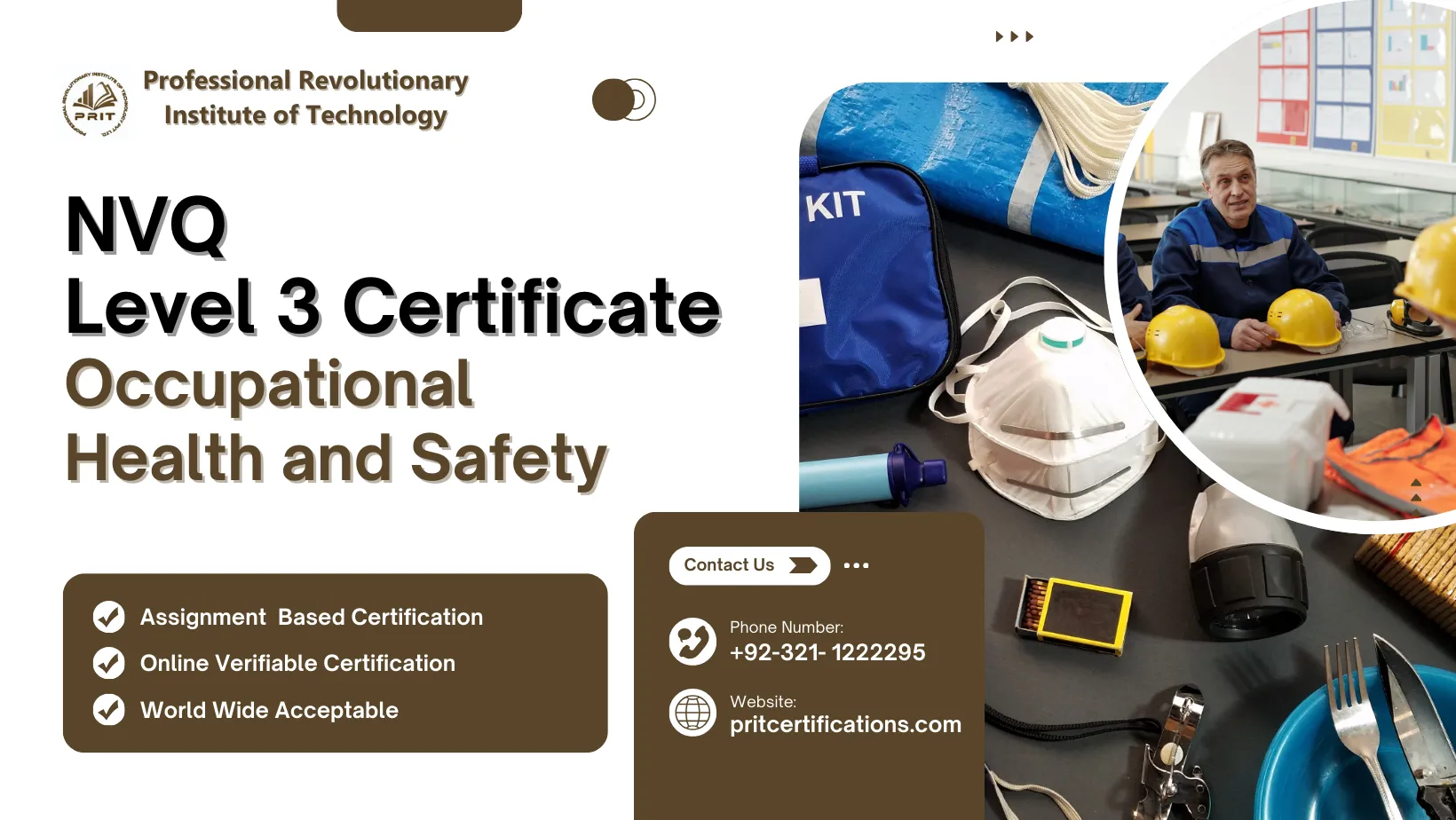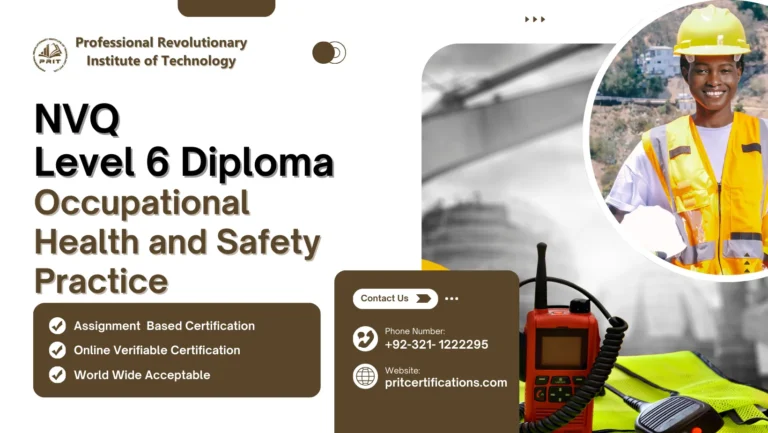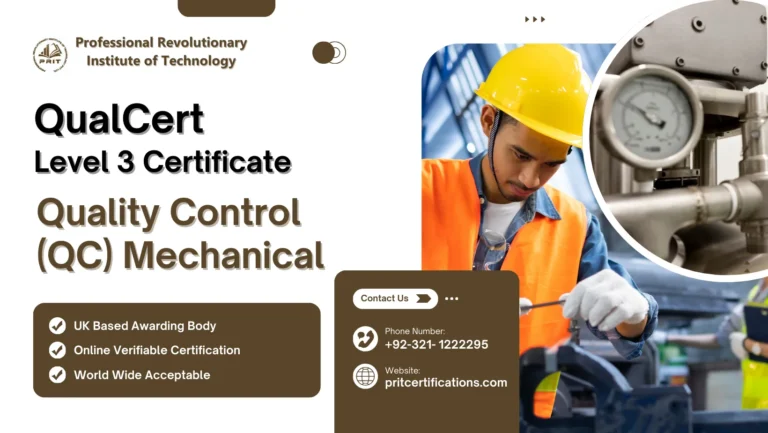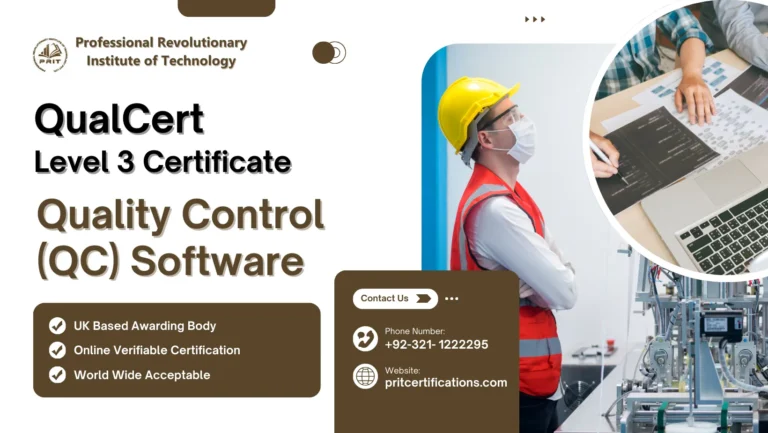
The NVQ Level 3 Certificate in Occupational Health and Safety is a practical qualification designed for individuals who want to develop a solid understanding of workplace health and safety principles. This course equips learners with the essential knowledge and skills to identify hazards, implement safety measures, and contribute to a safe working environment across a variety of industries.
The programme covers key areas such as risk assessment, accident prevention, compliance with health and safety legislation, and promoting a proactive safety culture. It is ideal for employees, supervisors, or team leaders who are responsible for maintaining safe working practices and ensuring that their teams follow regulatory standards.
By combining theoretical learning with practical application, this Level 3 certificate enables learners to confidently manage health and safety tasks, reduce workplace risks, and support organisational compliance. Completing this qualification demonstrates a commitment to professional development in occupational health and safety and provides a foundation for further advanced study or progression to higher-level NVQ health and safety qualifications.
Whether you are looking to enhance your current role, prepare for supervisory responsibilities, or start a career in health and safety, the NVQ Level 3 Certificate provides the essential skills and recognised certification needed to make a tangible impact on workplace wellbeing and organisational safety performance.
Course Entry Requirements:
The NVQ Level 3 Certificate in Occupational Health and Safety is designed for individuals who wish to gain practical knowledge and skills in workplace health and safety. This qualification is suitable for employees, supervisors, team leaders, or those looking to start a career in health and safety.
Applicants are expected to have:
- A Level 2 qualification or equivalent experience in any discipline, or relevant work experience in a workplace environment.
- Basic understanding of workplace practices and organisational structures.
- Proficiency in English, including the ability to communicate effectively, understand workplace instructions, and complete assessments to a professional standard.
- Motivation to develop health and safety knowledge and apply practical solutions to maintain a safe working environment.
These entry requirements ensure that learners have the foundational knowledge and skills to successfully engage with the course content, complete assessments, and apply occupational health and safety practices effectively in real-world work settings.
Course Study Units:
The Level 3 NVQ Certificate in Occupational Health and Safety consists of 5 mandatory units and 4 Optional Units. Candidates must complete all of the following Mandatory units and any Two Optional units.
Mandatory Units of Level 3 NVQ Certificate in Occupational Health and Safety
- Ensure responsibility for actions to reduce risks to health and safety
- Develop procedures to safely control work operations
- Monitor procedures to safely control work operations
- Promote a culture of health and safety in the workplace
- Conduct a health and safety risk assessment of the workplace
Optional Units of Level 3 NVQ Certificate in Occupational Health and Safety
- Investigate and evaluate health and safety incidents and complaints in the workplace
- Make sure actions in the workplace aim to protect the environment
- Review health and safety procedures in the workplace
- Supervise the health, safety and welfare of a learner in the workplace
Course Learning Outcome:
By successfully completing the NVQ Level 3 Certificate in Occupational Health and Safety course, you will acquire the following key learning outcomes:
- Comprehensive Understanding of Health and Safety Legislation: Gain a thorough knowledge of relevant health and safety legislation, regulations, and codes of practice. Understand your legal responsibilities as an occupational health and safety practitioner.
- Risk Assessment and Control Measures: Develop the skills to identify, assess, and manage workplace hazards effectively. Learn how to conduct comprehensive risk assessments and implement appropriate control measures to mitigate risks.
- Health and Safety Management Systems: Understand the principles of health and safety management systems, including their design, implementation, and monitoring. Learn how to develop and maintain effective systems to ensure continuous improvement in occupational health and safety.
- Promoting a Positive Safety Culture: Explore strategies for fostering a positive safety culture within organizations. Understand the importance of communication, employee engagement, and training in creating a safe work environment.
- Incident Investigation and Reporting: Acquire the knowledge and skills necessary to conduct thorough incident investigations. Learn how to identify root causes, implement corrective actions, and effectively communicate findings through comprehensive incident reports.
- Emergency Preparedness and Response: Understand the importance of emergency preparedness and response in minimizing the impact of workplace incidents. Learn how to develop emergency plans, conduct drills, and effectively respond to emergencies.
- Monitoring and Auditing: Gain insights into monitoring and auditing techniques to assess the effectiveness of health and safety practices. Learn how to identify areas for improvement and implement corrective actions to ensure compliance and continuous improvement.
- Collaboration and Communication: Enhance your communication and collaboration skills, enabling you to effectively engage with stakeholders, including employees, management, and regulatory bodies, to promote a culture of safety and facilitate successful health and safety initiatives.
- Ethical Considerations: Explore ethical considerations related to occupational health and safety, such as confidentiality, fairness, and equity. Understand the importance of ethical decision-making in creating a safe and inclusive work environment.
- Professional Development: Develop a commitment to lifelong learning and professional development within the field of occupational health and safety. Stay updated with the latest industry trends, practices, and regulations to enhance your expertise and career progression.
These learning outcomes are designed to equip you with the necessary knowledge, skills, and attitudes to become a competent occupational health and safety professional and make a positive impact on workplace safety.
Who Is This Course For?
The NVQ Level 3 Certificate in Occupational Health and Safety is ideal for individuals seeking to develop a strong foundation in workplace health and safety practices. This course is designed for those who want to take a proactive role in creating safer work environments and ensuring compliance with health and safety regulations.
This course is suitable for:
- Employees and Staff Members who want to enhance their understanding of workplace safety and hazard management.
- Supervisors and Team Leaders responsible for overseeing teams and maintaining safe working practices.
- Aspiring Health and Safety Practitioners looking to start a career in occupational health and safety.
- Workers in High-Risk Industries such as construction, manufacturing, engineering, and logistics who need formal health and safety training.
- Professionals Seeking Career Development in occupational health and safety, workplace compliance, or risk management.
By completing this certificate, learners gain practical skills and knowledge to identify hazards, implement safety measures, and support organisational compliance. The qualification prepares individuals to confidently contribute to a culture of safety in any workplace setting.
Course Benefits:
The NVQ Level 3 Certificate in Occupational Health and Safety provides learners with essential skills and knowledge to maintain safe workplaces and support organisational compliance. This qualification is practical, career-focused, and highly valued across multiple industries.
Key benefits include:
- Practical Health and Safety Skills: Learners gain hands-on knowledge to identify hazards, assess risks, and implement effective safety measures in the workplace.
- Enhanced Career Opportunities: This recognised qualification supports career progression, making learners more competitive for supervisory or health and safety roles.
- Regulatory Compliance Knowledge: Understanding health and safety legislation ensures learners can help their organisations meet legal obligations and maintain workplace safety standards.
- Improved Workplace Safety Culture: Graduates are equipped to promote a proactive approach to safety, reducing accidents and improving employee wellbeing.
- Foundation for Further Study: The Level 3 certificate provides a pathway to higher-level NVQ diplomas in occupational health and safety, leadership, and management.
- Professional Credibility: Completing this course demonstrates commitment to professional development and competence in workplace safety practices.
By completing the NVQ Level 3 Certificate, learners can confidently apply health and safety practices, support their teams, and contribute to creating safer, more compliant workplaces across various industries.
Course Future Progression:
Completing the NVQ Level 3 Certificate in Occupational Health and Safety provides a solid foundation for career development and further professional advancement in workplace safety. This qualification equips learners with the practical skills and recognised certification needed to progress in health and safety roles or supervisory positions.
Potential Career Pathways:
- Health and Safety Officer or Advisor: Oversee day-to-day safety practices, conduct risk assessments, and ensure compliance with health and safety regulations.
- Supervisor or Team Leader: Take on responsibility for maintaining safety standards and managing safe working practices for a team or department.
- Occupational Health and Safety Practitioner: Work in specialised roles across industries such as construction, manufacturing, logistics, and engineering.
- Safety Coordinator: Support the development and implementation of workplace safety policies and procedures.
Further Study and Professional Development:
- Progression to NVQ Level 4 or Level 5 Diplomas in Occupational Health and Safety, enabling more senior or managerial roles.
- Advanced training in risk management, emergency planning, and leadership in health and safety.
- Opportunities to achieve professional recognition through membership with institutions such as IOSH or NEBOSH, enhancing career credibility and progression prospects.
By completing this Level 3 certificate, learners gain the knowledge, confidence, and qualifications required to advance in their health and safety careers, take on greater responsibility, and contribute effectively to safer, compliant workplaces.






